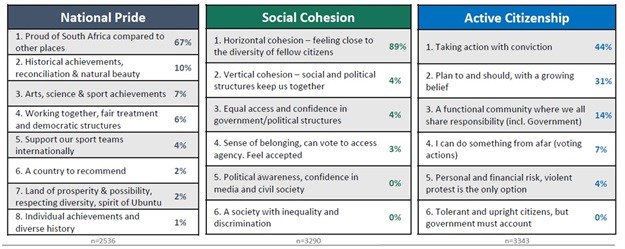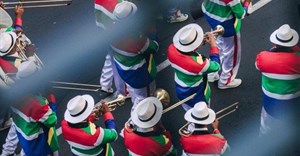
Brand South Africa releases results from Domestic Perceptions Research

A positive international perception of the nation brand begins at home seeing that it is influenced by the perceptions of citizens. The new structure of the project delivers monthly surveys, a fully nationally representative omnibus survey (conducted annually), focus groups, as well as in-depth interviews and monthly online surveys. This delivers more than six thousand records of data per year.
Three constructs, including national pride, social cohesion and active citizenship form an integral part of the project delivery. The attributes of each of the three constructs reflect some interesting information about the perceptions South Africans have of these issues. Insights delivered through the measurement of these constructs assists the organisation to manage the nation brand, and to effectively communicate and market the brand domestically and internationally.
During the development phase of the project during 2017 preparatory pilot surveys were conducted that assisted the organisation to develop the methodological approach to the domestic perceptions research. During the preparatory phase, the key attributes of the constructs were identified, and results from the pilot surveys are shown in order of its strength in the image below.

The attributes inform Brand South Africa how South Africans weigh the importance of these factors shown in the image above. The implication of this is that responses to future surveys will weigh results, against the importance of these attributes. This will provide a benchmark measure to see the extent to which South Africans themselves live up to, and act in accordance with the level of importance of the attributes.
National pride
National pride is defined as the love and devotion an individual/group has for their country. It is important to track national pride, as it gives a sense of the areas that make an individual/group proud to be part of the country and in turn tracks the levels of advocacy they have to promote the country through word of mouth.
Attributes 1 and 2: Proud of South Africa compared to other places, and Historical achievements, reconciliation and natural beauty. In terms of importance, these attributes contribute 77% to the strength of the construct. Currently, 25% of South Africans support these attributes as their main drivers of national pride, 1 in 4.
The attributes are nestled in the diversity of the country compared to other places and what we as a nation have achieved; complemented by the diversity of the country compared to other places and through the natural beauty of South Africa.
Social cohesion
Social cohesion tracks the levels of how cohesive citizens are; the degree of inclusivity and social integration. Brand South Africa’s domestic perceptions research identifies two types of cohesion:
1. Horizontal cohesion which is seen as an important indicator of social integration among members of communities. In this context, there are indicators that horizontal cohesion is more prevalent among the affluent.
2. Vertical cohesion is seen as an indicator that the state has to foster- this factor is seen at risk among those less affluent as a pillar of cohesion.
Attribute 1- Horizontal cohesion: In terms of importance, this attribute contributes 89% to the strength of the construct and is essentially the only reliable source of social cohesion. Currently, only 12% of South Africans support this attribute. Also, of concern is that those who do associate with the attribute do not show collective behaviour but rather an exclusiveness as a group of people, a niche shared sentiment.
Whilst on attributes 2 and 5: The second set of attributes, vertical cohesion and political awareness, only contribute 4% to the strength of the construct, however, it is supported by 31% of South Africans. Although these are grouped together, the two attributes are mutually exclusive. The higher the political awareness, the lower the support for vertical cohesion. This is in line with the exposure of corrupt government structures. An increase in one will result in a decrease in the other.
This, therefore, suggests that horizontal cohesion is at risk and evidently more strongly amongst the affluent, while vertical cohesion is more prevalent amongst those less affluent who also see it weakening as a pillar of cohesion in society.
Active citizenship
Active citizenship is the extent to which individuals come together in solidarity to uplift communities- imparting skills, values and participation for the collective good of the community.
With less than half the population actively involved, whether taking personal or shared responsibility with official structures, active citizenship in South Africa is a much more diverse involvement than proposed by international literature, such as those who look after one another against those who get involved in the local community, and helping others find better/alternative ways of living.
Attributes 1, 2 and 3: In terms of demographics, although affluence may play a part in providing the means to act against the wrong behaviour, it essentially boils down to personal conviction and the willingness to stand up against things that are wrong or helping others in need. Adults tend to have worked out ways they can help and are the strongest supporter of attribute 1, whereas youth want to help and find ways that work for them (attribute 2). Lastly, the older citizens want to live in a functional community while expecting accountability. These three attributes contribute 89% to the construct.
However, on the downside of Attribute 5: Constitutes 4% to the overall construct, with only 23% support by South Africans to this attribute. This is the disenchanted group and has probably spent a long time trying to rectify things without success and are now finding it impossible to bring about change without protest.
The aforementioned attributes and constructs affirm that the Nation Brand is never stagnant, but shaped by a multitude of attributes, politics, history and relationships. Therefore, in order to influence the Nation Brand and a positive perception among citizens, communication channels with government and private partners need to be strengthened. These role players’ awareness of the effects of their products and services on national perceptions play a crucial role in influencing behaviour and policy.
Perceptions research – Focus groups findings on national identity
As a young and evolving democracy, South Africa’s identity is also a proverbial ‘work in progress’. One of the components of Brand South Africa’s domestic perceptions research pertains to the delivery of focus three groups. During the latter part of 2017, Brand South Africa delivered three focus groups that concentrated on the theme of identity. As a Nation Brand marketing organisation, insight into national identity is a critically important issue. On the one hand, identity influences and should inform the approaches and strategy Brand South Africa develops, while on the other, identity formation is ongoing as society evolves. This article aims to share some insights from the first, and definitely not last focus groups to be hosted on the issue of national identity.
The focus group findings must be seen for what they are, as qualitative insight and should not be generalised. The aim of the focus groups was to establish what factors influence national identity. One of the underlying questions Brand South Africa aimed to interrogate through the focus groups was whether identity is predominately shaped by the standard demographic classifications such as language, race, gender and age, influence identity; Or more deep-rooted issues, based on experiences that culminate in an identity across race, age, culture and language

The main themes identified that shape the national identity were:

The residual impact of history holds some South Africans entrenched in the past. This blocks their foresight into the possibilities that the nation has and lessens the appreciation for the country. There is a lot of fear and mistrust in leadership, this perpetuates a lack of confidence from ordinary citizens. A range of aspects that negatively influences the perception of a national identity and causes concern about one’s own identity in these circumstances.
South Africans describe themselves using their experiences and how they resonate with specific events, and how these elicit a sense of togetherness and warmth to embrace one another. As illustrated in the image below the words are descriptive of national identity.

However, with these findings participants describe themselves as compassionate and people with strong cultural values. The perception is that people have become too reliant on the government, causing current frustration and anger, and not proactive to create opportunities for themselves. People need to let go of the past, as this is a stumbling block to the progression and where this country can move towards to unify and support the sense of a national identity Furthermore, findings indicate that most of the aspects that negatively affect the reputation of the country are driven by government.


















